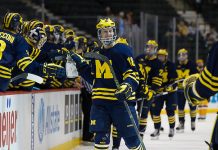As your humble Hobey predictor, this is the biggest moment of the year for me.
Yes, I know, there’s also the announcement of the Hobey Hat Trick and the winner to think about, but to me, this is the biggest challenge: pick all 10 finalists for college hockey’s top individual honor. It’s something I’ve been doing better than anyone else for the last couple of years, and now it’s time for me to do it again.
This seemed like one of the more open years in recent memory, which made my job much harder. Now, though, I think I’ve got a top 10 that should pretty much match Thursday’s announcement.
Here it is.
Brendan Smith, junior, defenseman, Wisconsin – I’ve said before that you could legitimately have four Hobey finalists from the Badgers, but if you go to Wisconsin’s official athletic website, there is only one candidate for college hockey’s highest individual honor, and that’s Smith. Personally, I think that UW will have more than one player honored (see below), but there’s no doubt who’s got the best shot at coming home with the hardware. As the nation’s top-scoring defenseman, a top-20 scorer overall, and a clutch player whose presence on the goals that count the most exceeds that of any of Wisconsin’s forwards, Smith remains the favorite (in my eyes) to win the award, and it’s hardly a surprise that he’s my first finalist pick.
Gustav Nyquist, junior sophomore, forward, Maine – For the second year in a row, a Swede will be among the 10 finalists, as Nyquist has led the Black Bears back to the championship weekend with a chance to make it to the NCAA tournament. And did I mention he happens to be the nation’s points-per-game leader? My feeling is that Nyquist needs a superb weekend and an NCAA tournament appearance to truly contend for the award, but at the moment, in good shape to be a finalist (Edited to put in the correct class year.).
Bobby Butler, senior, forward, New Hampshire – A commenter on my last post asked why Butler didn’t make my players-to-watch list last weekend. My feeling at the time was that Butler was a lock to be among the finalists, and – as opposed to Nyquist – his status wasn’t going to be impacted by the conference quarterfinals (UNH’s problems tend to start a bit later, after all). That said, I wasn’t counting on a pair of UVM shutouts putting the Wildcats on the tournament bubble. I said that Butler was a lock as a finalist – as a senior and a big-time goal-scorer, he has two qualities that Hobey voters tend to look very kindly on – and I’m standing by that now. If he’s played his last college game, though, then he’ll have gotten his last Hobey honor when he’s named a finalist. If he’s in the tournament, he’ll have a chance to move up.
Marc Cheverie, junior, goaltender, Denver – The Pioneers’ goaltender was as good as he needed to be numbers-wise against Michigan Tech, and I’ll be very surprised if he’s not in the Hobey Hat Trick. He’s been strong all season, his injury showed how badly Denver needs him in order to be the top team in the country, and he’s had some truly brilliant performances in net (including some where the numbers don’t fully tell the story. I don’t think his numbers will be good enough to win – don’t blame me, blame Ryan Miller (although his .937 save percentage isn’t THAT far from Miller’s .950) – but he’s a certain finalist, and likely for the Hat Trick.
Rhett Rakhshani, senior, forward, Denver – Rakhshani has gotten stronger over the course of the season, entering the Final Five as one of the nation’s top 10 scorers and a senior leader on a team that’s considered a favorite to go to the Frozen Four. He’ll take a backseat to his goaltender when the final votes are tallied, but he’s had a season worthy of a Hobey finalist nod, and I think he’ll get it.
Mark Olver, junior, forward, Northern Michigan – Two things worried me about Olver as a Hobey finalist: the fact that he plays for a school that’s been “off the beaten path” as of late, and NMU’s tendency to come up short on its big late-season runs. The fact that Olver was the top vote-getter in All-CCHA balloting assuaged one concern, and the fact that the Wildcats are going to the Joe took care of the other (for now). How much further can he go? If he can lead NMU to a Mason Cup and/or an NCAA berth, a Hat Trick honor could be in his future.
Ben Scrivens, senior, goaltender, Cornell – Scrivens made a great “closing statement” in the Big Red’s ECAC quarterfinal series against Harvard, stopping 42 of 43 shots in a two-game sweep of Harvard. That leaves him No. 2 in the country in both goals-against average (1.89) and save percentage (.933), and that should be enough to make him a finalist, regardless of whatever doubts exist about goalies who thrive in Cornell’s system.
Chase Polacek, junior, forward, Rensselaer – When I sized up the contenders a couple of weeks ago, I listed two ECAC Hockey players as “On Solid Ground.” One was Polacek, the other was Yale’s Broc Little. Well, a couple of things happened since I wrote that. One, Both Polacek and Little saw their teams eliminated from the ECAC Hockey playoffs by Brown. Two, Ben Scrivens solidified his hold on a spot. I don’t think there will be three finalists from ECAC Hockey, so somebody’s got to go, and I think it’s Little. Yale’s quarterfinal loss to Brown made a strong case that the absent Sean Backman, not Little, is the key player for Yale, and given that Backman was injured under circumstances that can be charitably described as “ill-advised,” it’s not like he’ll be picking up the votes. On top of that, Little is one reasonably equal part of a very balanced Yale attack, where Polacek was clearly “the man” for RPI, both in terms of overall scoring and in terms of his clutch performance. You will recall that when I calculated “Campellnomics” averages for the nation’s top skaters last month, Polacek led the field with a 1.10 CPPG average. Essentially, that means he could be counted on for one go-ahead goal per game. Little was also among the leaders, but if only one is going in, I’m thinking it’s Polacek.
Blake Geoffrion, senior, forward, Wisconsin – This is the toughest call for me to make, because could easily be one of three different Wisconsin forwards: Geoffrion, classmate Michael Davies or sophomore Derek Stepan. However, I think it’s going to be Geoffrion, and this is why. First, I’d take Stepan out of the mix. He’s a sophomore, and most of his points are assists. That doesn’t stand up well next to his two senior teammates. That leaves it between the two seniors, Geoffrion and Davies. You can make the case for Davies – he’s the Badgers’ top scorer with 1.37 points per game, and that leaves him as the nation’s No. 5 scorer. Still, I’m sticking with Geoffrion for two reasons. First, he has six more goals, and is No. 6 in the country in goals per game. Goal-scoring is a skill that has been highly valued, and I think that will play a role. Also, Geoffrion has been part of the national conversation longer. While Davies deserves tremendous credit for going from a mid-20s point man to a 48-point man with a shot at 50, Geoffrion has been growing his reputation as a goal-scorer consistently over the course of his Wisconsin career (and it doesn’t hurt when you have one of the most famous last names in the sport). It’s the pick I feel shakiest about, but I’m going with Geoffrion.
Cory Conacher, junior, forward, Canisius – I’m a believer now. Conacher heads to Rochester for the Atlantic Hockey championship as the No. 2 scorer in the country, playing for a team that is enjoying its best season since 2000-01. He assisted on the overtime goal that guaranteed the Golden Griffins a spot in Rochester. Add that to the fact he’s doing it with diabetes, and it’s not hard to give Conacher the nod here over Matt Read, Nick Johnson, or anyone else from the CHA and Atlantic Hockey. Top scorers from Atlantic Hockey may have been ignored in the past, but that was before Holy Cross beat Minnesota and Air Force beat Michigan.
There you have it, folks. Those are my 10 picks. Will I go 10 for 10? Will I lead the media field in correct picks (again)? The possibilities are out there.


